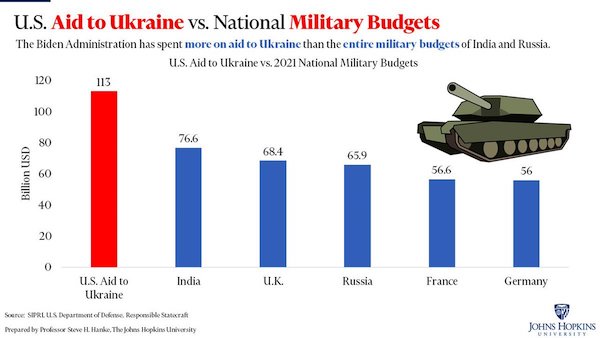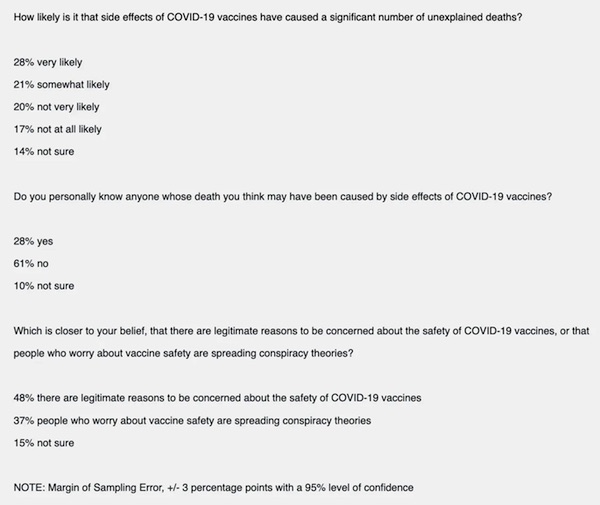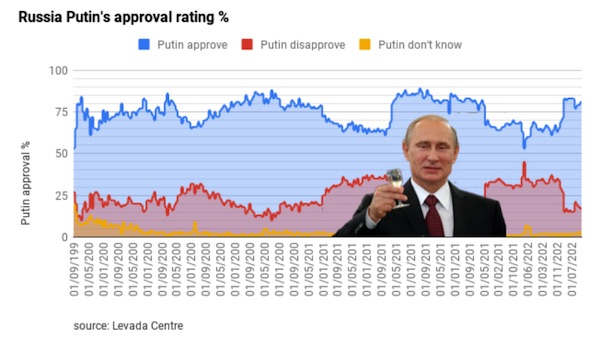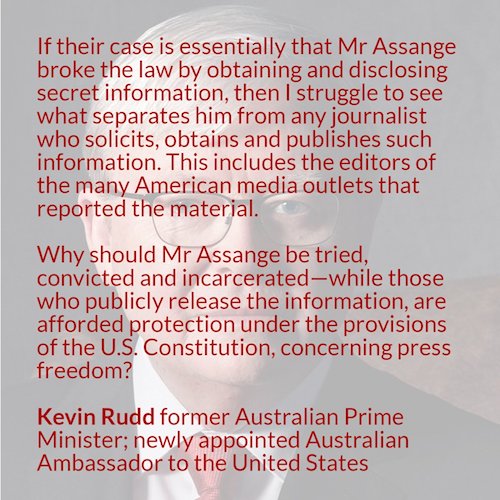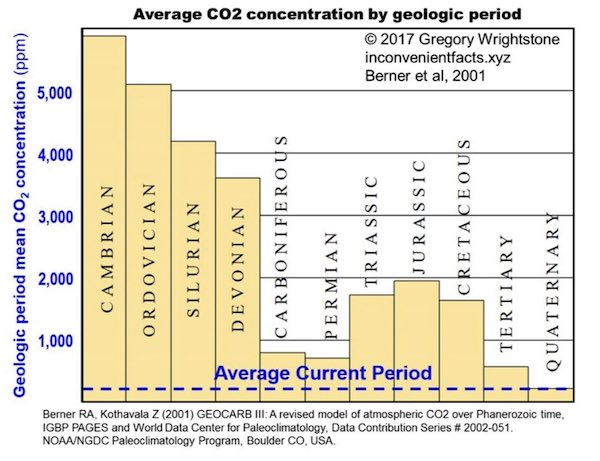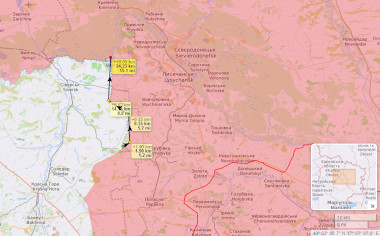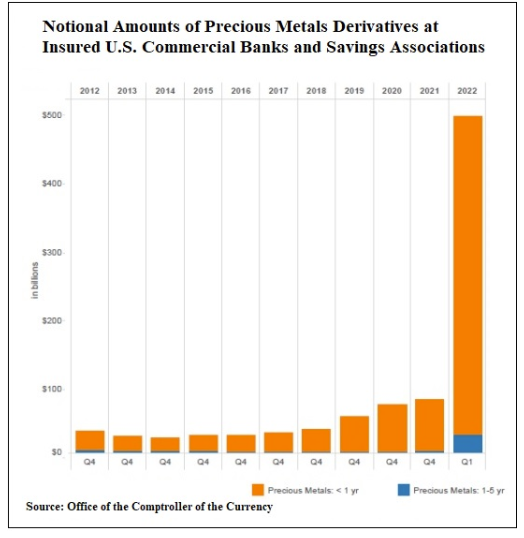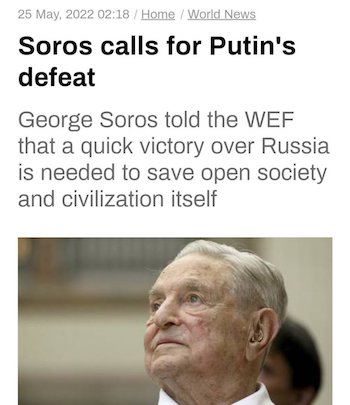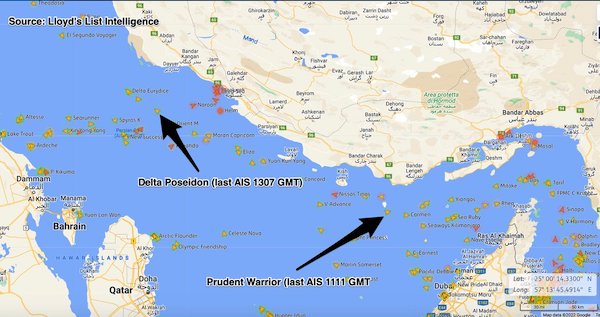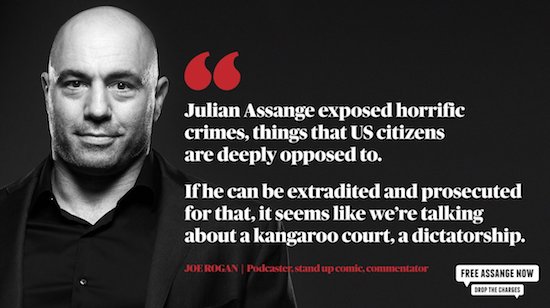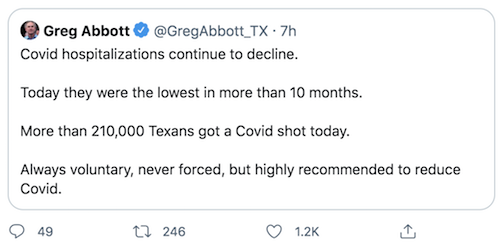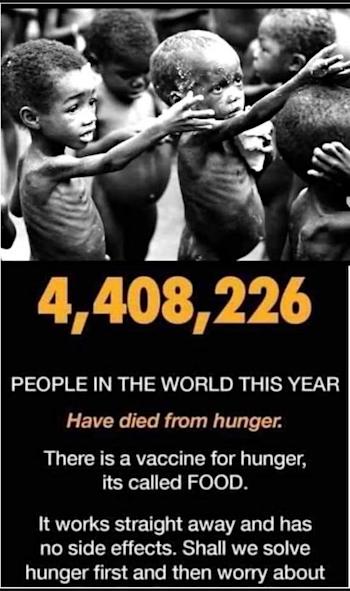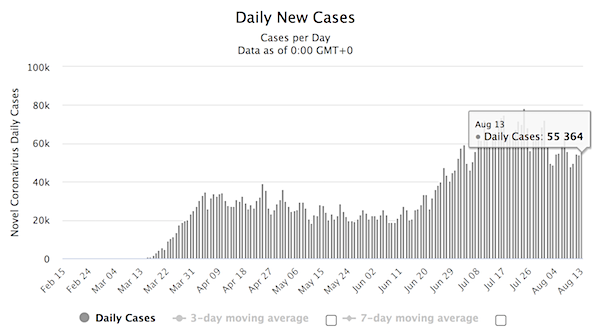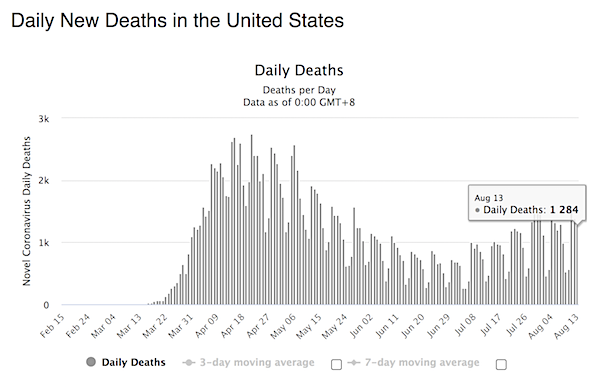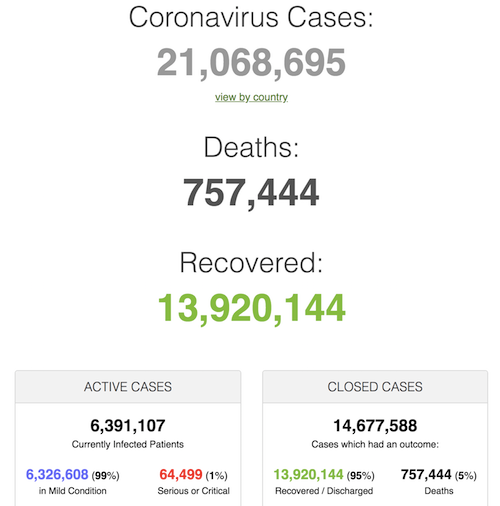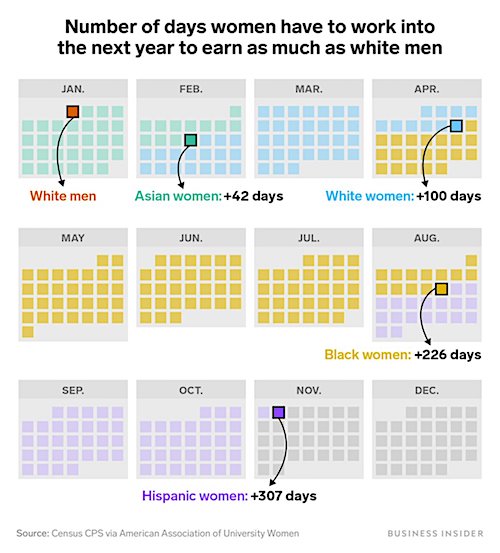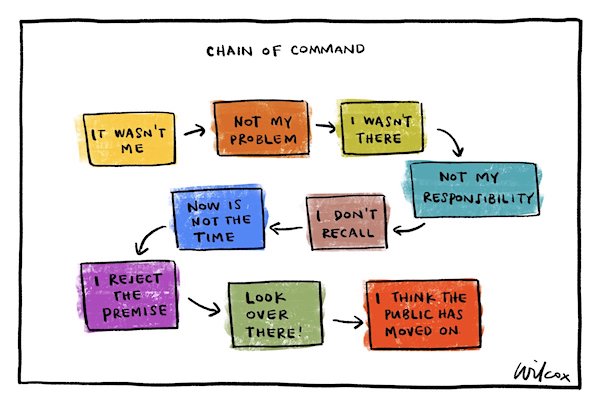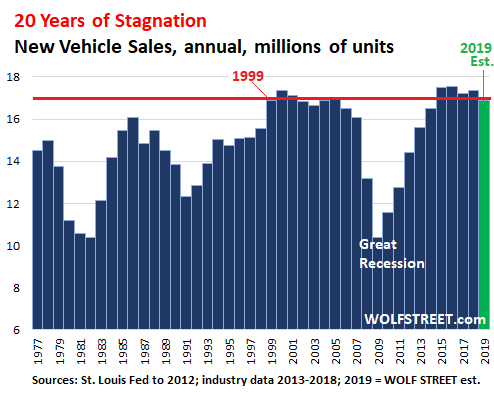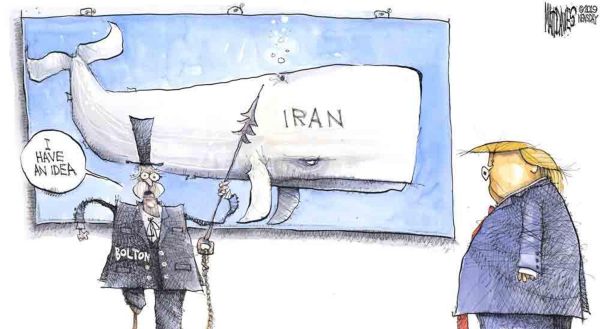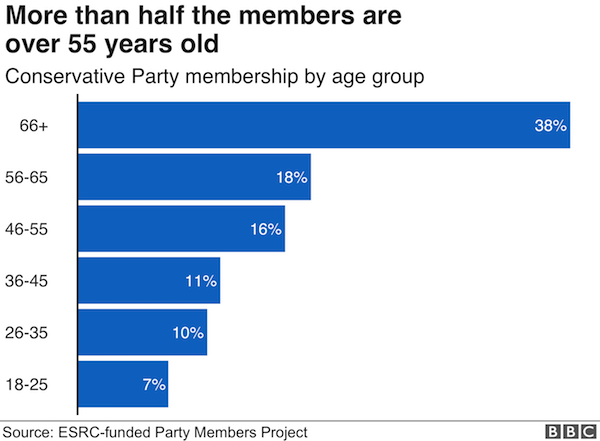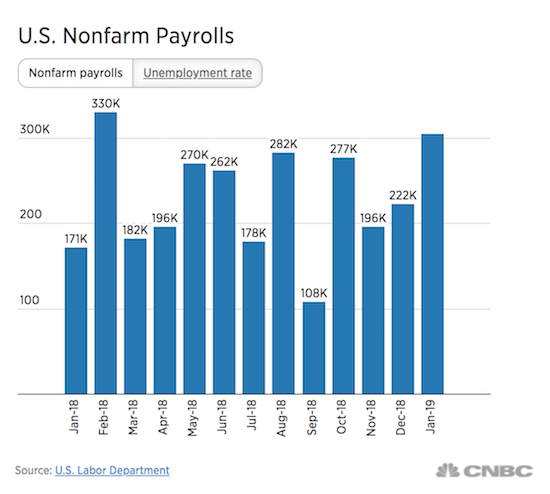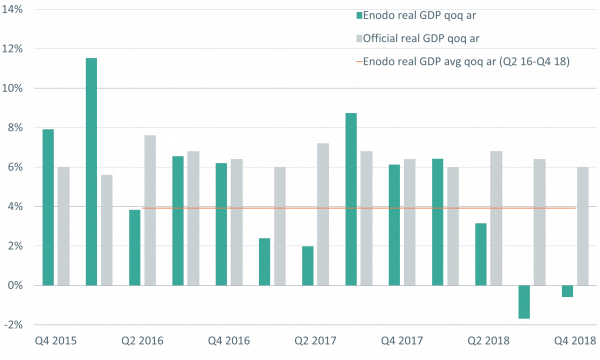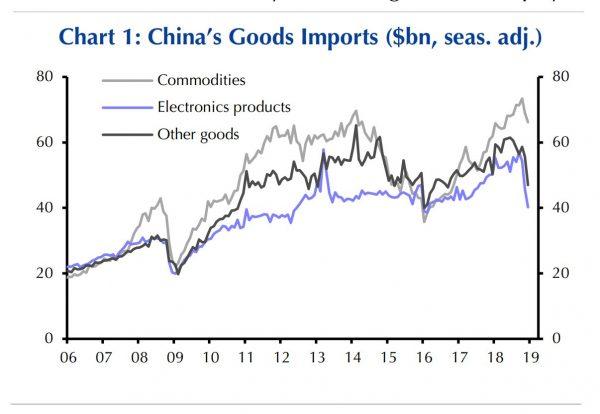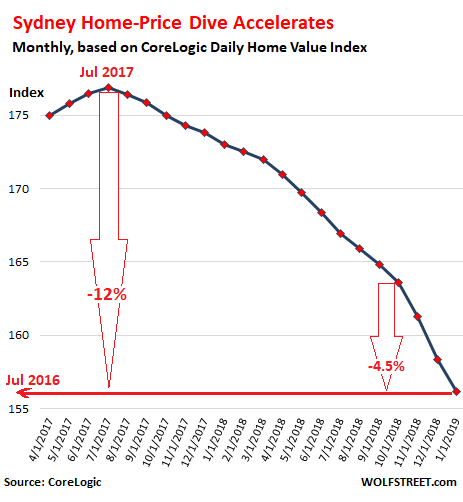
Rembrandt van Rijn Belshazzar’s feast 1635-38

Russia at the UN Security Council: “Why should the American people pay out of their own pockets for the military adventures of the Democratic Party?”
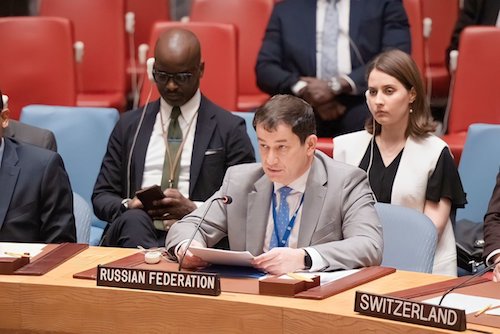

Alex Jones
BREAKING: Alex Jones says a TSA whistleblower has told him TSA employees were instructed on Tue that masks are coming back by October for travelers & full Covid restrictions/lockdowns by December due to a new “dangerous variant” out of Canada. pic.twitter.com/sw4b2XYuoh
— Melissa Tate (@TheRightMelissa) August 19, 2023

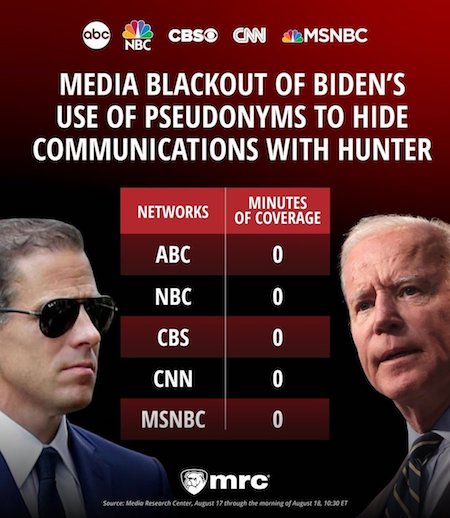




“..the US “does not have the best historical record when it comes to supporting its allies..”
• Ukraine Faces A ‘Grim Future’ – Lavrov (RT)
The West is fighting to the last Ukrainian on a fool’s errand to “defeat” Russia, but the prospects for that plan are not looking good, Russian Foreign Minister Sergey Lavrov told International Affairs in an interview published on Saturday. “The future looks rather grim for the Kiev authorities and their patrons,” Lavrov said. “The longer the armed clashes last, the less appetite will the Western investors have to contribute to post-conflict recovery in Ukraine, and the weaker their faith in Ukraine’s success on the battlefield, or its ability to preserve its statehood in any form or within any borders.” That’s without even considering Kiev’s inability to repay its government debt, which will most likely end up as the burden of Western taxpayers, “causing more inflation and lower living standards,” the diplomat added.
Lavrov noted the recent analysis by the Heritage Foundation, which found that the US has already committed $113 billion to Ukraine, which works out to $900 per household, “plus $300 in interest for servicing the corresponding debt.” “These are huge amounts of money, especially considering the challenging situation in the global economy.” Western leaders have vowed to support Kiev “for as long as it takes” and seem to have chosen “fighting until the last Ukrainian,”as has President Vladimir Zelensky, but the US “does not have the best historical record when it comes to supporting its allies,” he said.
“Suffice to remember its abrupt withdrawal of military aid to South Vietnam in 1973 and to Ashraf Ghani’s regime in Afghanistan in 2021, as well as the fact that these moves immediately caused the downfall of the governments loyal to the US,” Lavrov explained, adding that Ukraine today “depends almost entirely” on Western funding and arms deliveries. Russia understands that “the West wants to do away with our country as a serious geopolitical rival,”Lavrov said, but the US and its allies must understand that Moscow “will use all means to defend its people and its vital interests.” “It would be better for our opponents to understand that confrontation with Russia is futile and switch to more civilized, i.e., political and diplomatic means for achieving a balance of interests,”the foreign minister said.

Former military became too obvious on TV..
• Think Tank Experts Pushing Ukraine Conflict Share A Common Benefactor (Marsden)
[..] while the generals of the Iraq War era had all the subtlety of a sledgehammer in representing the interests of the military-industrial complex, the new salesmen of endless armed conflict in Ukraine have overwhelmingly adopted the more subtle model. A study published in 2020 found that the top 50 think tanks received over a billion dollars from the US government and its defense contractors and manufacturers, including some of the biggest beneficiaries of weapons production today ‘for Ukraine’. The top recipients of this funding include the Atlantic Council, German Marshall Fund of the United States, Brookings Institution, Heritage Foundation, Center for Strategic and International Studies, New America Foundation, RAND Corporation, Center for a New American Security, Council on Foreign Relations, and the Stimson Center.
Some of these black boxes are more ideologically-driven than others. The Heritage Foundation, for example, leans overwhelmingly neoconservative and interventionist. Others, like the Atlantic Council and German Marshall Fund, are effectively force multipliers for NATO talking points. But the RAND Corporation also houses systems analysts and scientists specializing in space and computing. The fact that not all of these entities – or even the people who work within some of them – can be tossed into the same basket and labeled mere parrots for the special interests of their organization’s benefactors helps to muddy the waters.
In an analysis published in June of media coverage related to US military involvement in Ukraine, the Quincy Institute for Responsible Statecraft found that, when a think tank is cited regarding the issue, 85% of the time it’s a think tank with “financial backing from the defense industry.” Taken at face value, this risks being interpreted by the general public as expert ‘consensus’ on the need for US taxpayers to continue flooding Ukraine with weapons, unaware that it’s really just a bunch of Pentagon-backed actors agreeing with each other about the need to pursue the most profitable course of action on behalf of their War Inc. sugar daddies. Just like when climate scientists, who have parlayed climate change into endless funding and a perpetual justification for their existence, aren’t going to kill their cash cow by arguing that the climate can’t be controlled by man and that throwing cash at the issue – or at them – is futile.
Many of the Ukraine think tank experts are quick to attack analysis and information published on platforms they don’t like – such as RT – as ‘Russian-backed’. You’d have to be living under a rock these days to not know that RT is linked to Russia. No transparency issues there. But there is far less transparency around their own organizations’ financing. Where is their insistence on being above board about the use of defense industry cash to influence not just the general public but the course of the conflict itself? Around a third of top foreign policy think tanks don’t disclose this Pentagon funding, according to the Quincy Institute. Nor is it unheard of for these experts to springboard from these establishment-friendly platforms and the public notoriety they provide, right into public office – where they can translate the same agenda that they promoted into actionable policy. Isn’t it important for voters to consider the powerful hidden hand who helped to get them there?

“The jewel in the crown was to be Zelensky’s achievement of Putin’s unconditional surrender after the lightning spring offensive.”
• Summer of the Hawks (Seymour Hersh)
It’s been weeks since we looked into the adventures of the Biden administration’s foreign policy cluster, led by Tony Blinken, Jake Sullivan, and Victoria Nuland. How has the trio of war hawks spent the summer? Sullivan, the national security adviser, recently brought an American delegation to the second international peace summit earlier this month at Jeddah in Saudi Arabia. The summit was led by Crown Prince Mohammed bin Salman, known as MBS, who in June announced a merger between his state-backed golf tour and the PGA. Four years earlier MBS was accused of ordering the assassination and dismemberment of the journalist Jamal Khashoggi at the Saudi consulate in Istanbul, for perceived disloyalty to the state. As unlikely as it sounds, there was such a peace summit and its stars did include MBS, Sullivan, and President Volodymyr Zelensky of Ukraine.
What was missing was a representative of Russia, which was not invited to the summit. It included just a handful of heads of state from the fewer than fifty nations that sent delegates. The conference lasted two days, and attracted what could only be described as little international attention. Reuters reported that Zelensky’s goal was to get international support for “the principles” that that he will consider as a basis for the settlement of the war, including “the withdrawal of all Russian troops and the return of all Ukrainian territory.” Russia’s formal response to the non-event came not from President Vladimir Putin but from Deputy Minister of Foreign Affairs Sergei Ryabkov. He called the summit “a reflection of the West’s attempt to continue futile, doomed efforts” to mobilize the Global South behind Zelensky.
India and China both sent delegations to the session, perhaps drawn to Saudi Arabia for its immense oil reserves. One Indian academic observer dismissed the event as achieving little more than “good advertising for MBS’s convening power within the Global South; the kingdom’s positioning in the same; and perhaps more narrowly, aiding American efforts to build consensus by making sure China attends the meeting with . . . Jake Sullivan in the same room.” Meanwhile, far away on the battlefield in Ukraine, Russia continued to thwart Zelensky’s ongoing counteroffensive. I asked an American intelligence official why it was Sullivan who emerged from the Biden administration’s foreign policy circle to preside over the inconsequential conference in Saudi Arabia.
“Jeddah was Sullivan’s baby,” the official said. “He planned it to be Biden’s equivalent of [President Woodrow] Wilson’s Versailles. The grand alliance of the free world meeting in a victory celebration after the humiliating defeat of the hated foe to determine the shape of nations for the next generation. Fame and Glory. Promotion and re-election. The jewel in the crown was to be Zelensky’s achievement of Putin’s unconditional surrender after the lightning spring offensive. They were even planning a Nuremberg type trial at the world court, with Jake as our representative. Just one more fuck-up, but who is counting? Forty nations showed up, all but six looking for free food after the Odessa shutdown”—a reference to Putin’s curtailing of Ukrainian wheat shipments in response to Zelensky’s renewed attacks on the bridge linking Crimea to the Russian mainland.

Many would surrender given the chance.
• Zakharova Appeals to Ukrainian Troops: Resist Kiev Regime or Surrender (Sp.)
Maria Zakharova, the official spokeswoman for the Russian Foreign Ministry, has advised soldiers of the Ukrainian Armed Forces to either turn their weapons against the Kiev regime or surrender. The diplomat’s comment was published on the ministry’s official website. “We strongly recommend Ukrainian servicemen who are convinced of the criminal nature of the bandit junta that has seized their country to either turn their weapons against it or surrender to our forces,” the official noted. Zakharova also emphasized that in such cases, the humane and dignified treatment of Ukrainian military personnel will be ensured. She also stressed that the criminal Kiev regime continues to shell Russian cities and villages with NATO weapons, including with banned cluster munitions. These actions result in civilian casualties, including children.
In early July, the US government announced it would send hundreds of thousands of cluster bombs to Ukraine to aid its struggling counteroffensive. The munitions, fired from howitzers, are intended to bolster Ukrainian forces. The move came after significant losses, including more than 43,000 Ukrainian soldiers and more than 4,900 military vehicles. The US pre-positioned these weapons prior to the announcement, and their use began shortly thereafter. These cluster bombs, similar to depleted uranium shells in Ukraine’s tanks, pose the risk of widespread unexploded bomblets, leaving areas dangerous for years. The US and its allies have provided nearly $100 billion in support since February 2022 as Ukrainian forces face Russian superiority, raising concerns about waning Western interest in the ongoing conflict.

“..just understand, don’t kid yourself, no matter what y’all say, that’s called World War III,” Biden said..”
• Biden Sends F-16s To Ukraine Despite Saying This Would Lead To World War 3 (PM)
A US official announced on Thursday that the Biden administration has approved the sending of American F-16 fighter jets to Ukraine from Denmark and the Netherlands. According to Reuters, the US gave official assurances to Denmark and the Netherlands that an expedited approval of transfer requests for F-16 jets to go to Ukraine would be given as soon as pilots are trained. “We welcome Washington’s decision to pave the way for sending F-16 fighter jets to Ukraine,” Dutch Foreign Minister Wopke Hoekstra said. “Now, we will further discuss the subject with our European partners.” Danish defence minister Jakob Ellemann-Jensen said on Friday, “The government has said several times that a donation is a natural next step after training. We are discussing it with close allies, and I expect we will soon be able to be more concrete about that.”
The Danish defence ministry said that a coalition of 11 countries will start training Ukrainian pilots to fly the jets in Denmark later this month. In 2022, Biden said of sending US jets into Ukraine, “that’s called World War III,” rejecting Poland’s offer at the time to transfer 28-Soviet-designed MiG-29s after Secretary of State Antony Blinken said Poland had a “green light.” “The idea that we’re going to send in offensive equipment and have planes and tanks and trains going in with American pilots and American crews — just understand, don’t kid yourself, no matter what y’all say, that’s called World War III,” Biden said. In January, he was asked if he would send F-16s to Ukraine, and responded simply “no.”
Ukraine’s President Volodymyr Zelensky, however, has continued to insist that the planes be given, and as with almost all that Zelensky has asked for Biden relented. In March, Ukrainian fighter pilots were trained on F-16 simulators in Arizona, allowing “us to better help Ukrainian pilots become more effective pilots and better advise them on how to develop their own capabilities,” a defense official said at the time. By May, Biden had authorized sending F-16s to Ukraine from G7 allies who had their own stock of jets. Russia has warned that they saw this move as a US and allied escalation in the ongoing conflict.

“..a distraction and waste of valuable resource..”
• Biden Administration Officials Doubt Usefulness of Ukrainian Strikes on Crimea (Sp.)
The decision by the Ukrainian military to strike targets on the Crimean Peninsula is being perceived with skepticism by several officials in the US government, a American TV broadcaster reported on Friday. As the Ukrainian armed forces continuously increase their strikes on Crimea in attempts to disrupt Russian logistics and military supply chains, a number of officials from President Joe Biden’s Administration are expressing doubt about the usefulness of such initiatives, the media mentioned. Targeting Crimea is seen as a distraction and waste of valuable resources at a time when Ukraine has considerably stretched its combat axes, the official stated, adding that although the Russian military has been slightly affected, the attacks haven’t decisively changed the situation at the frontlines.
“It’s knocked the Russians off balance a bit, but it is not doing anything decisive,” a senior officer told the agency, claiming that it would be best if the focus were placed on the counteroffensive. The report added that attacking Crimea is part of Ukraine’s counteroffensive strategy, but due to the recent nature of the increased strikes, the US and its allies have a hard time assessing the impact it is having on Russia’s efforts to contain Kiev’s offensive operations. The agency said the US is not actively advising Ukraine to strike Crimea, specifying that the longer the counteroffensives stalls, the higher the chances of failure are.

“Appointing David as a special counsel is like keeping the concept of a [Justice Department] protecting Democrats while hunting Republicans..”
• US Judge Dismisses Hunter Biden’s Misdemeanor Tax Charges (Manley)
A federal judge handling Hunter Biden’s case made the decision on Thursday to dismiss misdemeanor tax charges against the president’s son, a move that came not long after his plea deal collapsed and a special counsel was assigned to his ongoing investigation. The two misdemeanor charges dropped by US District Judge Maryellen Noreika include Hunter’s failure to pay his taxes on time in 2017 and 2018. Special counsel David Weiss had asked that the charges in Delaware to be dismissed so that new charges could be brought in California or Washington, DC. The decision was agreed to by Hunter Biden’s lawyers as those charges were attached to a now-defunct plea deal.
Weiss was appointed to lead the case against Hunter last Friday by Attorney General Merrick Garland, a decision largely criticized by Republicans.
“Appointing David as a special counsel is like keeping the concept of a [Justice Department] protecting Democrats while hunting Republicans,” said Senator Tim Scott (R-SC) in an interview with US media last week. “I can’t think of a more forceful sign that nothing has changed.” While Hunter had agreed to plead guilty to his misdemeanor charges in exchange for a probation sentence, the deal fell apart during a plea hearing over a separate gun charge as well as questions the judge had about the deal. “After the hearing, the parties continued negotiating but reached an impasse. A trial is therefore in order,” said prosecutors last week, indicated they would charge Hunter in either Washington, DC or California. “The Government, in the exercise of its prosecutorial discretion, is considering what tax charges to bring in another district and may elect to bring the same charges set forth in the instant information or different ones,” the filing said.

“..90% of the Nigerien population has zero access to electricity, and Niger gets to keep just 13% of the value of the uranium mined there…”
• Divisions Over Niger Creating New Frays in Franco-American Relationship (Sp.)
The United States and France are once again at odds, this time over how best to respond to the military takeover in Niger last month. While the two allies share a common goal of restoring the ousted pro-Western government, Washington has upset Paris by charting its own path in what the French commonly regard as their own backyard. French diplomats are furious that their American counterparts are willing to speak with the Nigerien government in power, especially without preconditions, according to reports in Western media. They fear that any kind of engagement will further legitimize the Nigerien military’s actions.
[..] After the military seized power on July 26 and placed the ousted president, Mohamed Bazoum, under house arrest, the new government asked French forces to leave the country – they refused. As talk grew of a military intervention, either by the US, France, or the West African bloc ECOWAS, the governments of Niger, Burkina Faso, Mali, and Guinea issued a joint statement declaring an attack on Niger was an attack on all four countries. That hasn’t stopped ECOWAS from pushing ahead with intervention plans, summoning its member nations’ standby forces and holding preparatory talks in Ghana on Thursday. Cote D’Ivoire, Benin, Guinea-Bissau, Senegal, and Nigeria have all shown support for the initiative. Over the last three years, the other three nations – all former French colonies like Niger – have seen coups, uprisings, and revolutions that have deposed unpopular pro-French governments.
With the exception of Guinea, the Sahelian countries have seen years of war as French forces waged a War-on-Terror-style military campaign against Islamist rebels, many of whom have capitalized on the chaos in nearby Libya created by the NATO war that overthrew Muammar Gaddafi in 2011. The highly unpopular wars, which have succeeded more at killing innocent civilians than they have at quashing the rebels, have been increasingly opposed by local residents, and the new governments have severed their cooperation with French operations after coming to power. Moscow has voiced its support for the Nigerien military government and vocally opposed an intervention to restore Bazoum to power.
A poll earlier this month that mostly sampled residents of the country’s capital and largest city, Niamey, found extremely wide support for the coup: 78% support the military’s actions and 73% believe it should stay in power for an extended period, or until new elections can be held. Niger was a French colony until winning its independence in 1960. Despite the formal separation, France has retained a powerful hold on Nigerien politics and economics, with French companies owning all or part of the three largest uranium mines in Niger, which together supply fuel to nuclear power plants that keep one-third of the lights on in France. Meanwhile, 90% of the Nigerien population has zero access to electricity, and Niger gets to keep just 13% of the value of the uranium mined there.

ECOWAS has already fallen apart..
• Niger’s Neighbors Set ‘D-Day’ for Intervention (RT)
Military chiefs of the Economic Community of West African States (ECOWAS) have decided on a date for sending troops into Niger, the bloc’s Commissioner for Political Affairs, Peace and Security Abdel-Fatau Musah said on Friday. “We are ready to go anytime the order is given,” Musah told reporters after the two-day meeting of the bloc’s Committee of Chiefs of Defense Staff in Accra, Ghana. “The D-day is also decided. We’ve already agreed and fine-tuned what will be required for the intervention.” “Let no one be in doubt that if everything else fails, the valiant forces of West Africa, both the military and the civilian components, are ready to answer to the call of duty,” Musah said.
Speaking at the closing ceremony of the military meeting, Musah brought up previous ECOWAS deployments in Gambia and Liberia as examples of successful intervention, and vowed that “constitutional order will be restored” in Niger “by all means available.” The bloc was also preparing a “mediation mission” to Niamey, he added, in order to give diplomacy a chance. Earlier this week, the ECOWAS military chiefs announced they had “commenced the activation of the Standby Force” for intervening in Niger, where the military ousted President Mohamed Bazoum on July 26.
ECOWAS initially gave Niamey a seven-day deadline to restore Bazoum, said it had “finalized plans” for intervention on August 4, and announced the activation of the Standby Force force on August 10. According to the French broadcaster RFI, the bloc is mustering about 25,000 troops, mostly from Nigeria and Senegal. Not all members of the bloc are on board with intervention. Chad and Guinea have opposed both sanctions on Niger and military deployment. The military governments in Burkina Faso and Mali said they would regard any military move against Niamey as a declaration of war against themselves.
Niger has accused ECOWAS of acting as the proxy of France, the country’s former colonial ruler. Speaking on Friday, Musah insisted that the bloc is a “rules-based organization,” ready to intervene alone or with support of “other democracy-loving partners.” Niger’s uranium mines provide a substantial amount of fuel for France’s nuclear reactors. Paris has 1,500 soldiers based in the country, which the new government in Niamey wants gone. The US has another 1,000, likewise declared unwelcome. They were deployed to fight against a variety of terrorist and insurgent groups that arose in the Sahel in the aftermath of NATO’s 2011 “regime change” intervention in Libya. In recent years, the military governments in Mali and Burkina Faso have ordered all Western troops to leave, turning to the Russian Wagner Group for security services instead.

“This change is not really dramatic and all at once, but it’s ongoing,” Roberts said, emphasizing the gradual nature of the process.”
• Paul Craig Roberts: The End of US Dollar Hegemony (Sp.)
“The problem with the dollar has been brewing for a very long time. And I think in order to comprehend the kinds of problems the United States is very likely to face in the near future, we need to understand what is going wrong with the American economy and how the dollar has been set up for a serious loss in value,” Dr. Paul Craig Roberts, a veteran economist, author and former assistant secretary of the Treasury, told Sputnik. “That,” Roberts said, and not never-ending debates about the prospects of a recession, or even who the current occupant of the White House is, is the “pertinent problem” for the United States and the rest of the world today.
Delving into the history of the dollar’s status as a world reserve currency, from the creation of the Bretton Woods Agreement-based financial world order after World War II to President Nixon’s deal with Saudi Arabia to create the petro-dollar in the 1970s, the economist noted that reserve currency status has endowed the US with the power to basically create money and debt out of thin air, and to facilitate economic policies which no other country on Earth could afford to pursue. “All central banks held their reserves in dollars or in dollar-denominated assets, US Treasury bonds, and today, US equities. So there’s been a huge demand for dollar-denominated assets, financial assets, stocks and bonds, bills that are held as reserves by all foreign central banks. That’s how they settle their trade differences.
What this means is that there’s always financing for America’s budget deficits and America’s trade deficits because the dollars are reserves and countries use them to settle their trade differences. And of course, [as] the world economy grows slowly over time, the amounts become larger. So there’s never been a problem with financing US debt – neither the budget deficit nor the trade deficit,” Roberts explained. Despite $1 trillion+ deficits becoming “a part of American life,” and the US driving itself further into debt by offshoring its manufacturing base to Asia, most US economists, apart from a handful of fiscal conservatives, didn’t seem to mind this state of affairs, perhaps expecting it to last forever. “But what is changing? Well, we see with the American sanctions on Russia and other countries and the tendency of these sanctions to expand and just be applied anywhere now to any point. What this has done is made other countries realize, ‘hey, holding our reserves in dollars means we’re also under the Americans’ thumb.
If we don’t comply with their foreign policies, their financial policies, they can confiscate our reserves as Washington did to Russia,’” Roberts said. Combined with US efforts to use the dollar to affect adversaries’ ability to engage in international trade, these countries, and others nations, have begun turning to alternatives to American money. “So we see now a movement away from the use of the dollar as reserve currency. We see countries now focusing on keeping their reserves in gold and in the currencies of their trading partners. And we see now that international balances between countries, that trade differences are being settled in other currencies, in their own currencies, in the currencies of their trading partners. This change is not really dramatic and all at once, but it’s ongoing,” Roberts said, emphasizing the gradual nature of the process.

“Between 2000 and 2021, Chinese exports to Africa skyrocketed from just $5 billion to over $145 billion, climbing further, to $164.5 billion, in 2022..”
• Beijing Bets on BRICS as Biden Ramps Up Tech and Trade War (Sp.)
President Xi is set to touch down in South Africa next Monday for a four-day state visit. The overseas trip is Xi’s first since his visit to Moscow in March for talks with Russian President Vladimir Putin. Along with his attendance of the BRICS Summit, the Chinese leader is set to meet with South African President Cyril Ramaphosa and other regional leaders for the China-Africa Leaders Dialogue, a platform helping to facilitate Beijing’s ambitious vision for ramping up trade, investment, infrastructure, resource extraction and energy cooperation with the African continent. As a founding member of the BRICS group, China received a new impulse for policy, infrastructure, trade, finance and people-to-people contact-based coordination for its global Belt and Road infrastructure and trade initiative.
Using BRICS, Beijing has been able to ramp up infrastructure cooperation with Russia and other Eurasian Economic Union members, and to sign a memorandum of understanding with South Africa on the construction of a ‘21stCentury Maritime Silk Road’. And although China has grown into an economic superpower in its own right over the past two decades, the BRICS format provides the Asian giant with an important tool of leading developing economies to expand markets and secure crucial natural resources and food. Brazil and India, for example, are among the top five largest food producers in the world, while Russia and South Africa are among the leading global producers of resources like gold, diamonds, bauxite, lithium and chromium in the world. Combined, the BRICS bloc rivals the economic power and influence of the G7.
China was able to forge its economic rise by ramping up investment and trade cooperation with the United States and other Western countries. Even today, the US, Japan, South Korea, the Netherlands and Germany remain among the top ten export destinations of Chinese goods. However, under President Xi, China has gradually and carefully moved to reorient trade policy toward other countries, including Russia, and developing nations across Asia, Africa and Latin America. This shrewd strategy, signaling a slow split from the vision of ‘Chimerica’ – the early 21st century vision of an economic super bloc in which China and the US are inexorably linked to one another economically, helped Beijing avoid economic catastrophe after the US launched a continually escalating trade and technology war against China in 2018.
[..] Modest Chinese investment in Africa began in earnest in the 1970s and 1980s, but saw a major boom beginning starting the 2000s as the Asian nation began to bear the first fruits of its drive to become the industrial “workshop of the world.” Between 2000 and 2021, Chinese exports to Africa skyrocketed from just $5 billion to over $145 billion, climbing further, to $164.5 billion, in 2022. China importing some $117.5 billion in goods and resources from the continent last year. Chinese investment in, loans to and trade with Africa have become so intensive over the past decade that it has already overtaken the United States as the continent’s largest trading partner, and is expected to top the European Union’s combined trade with Africa by the end of the current decade.
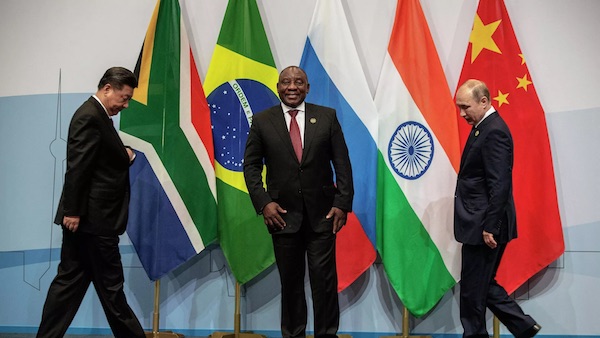
BRICS Johannesburg 2018. Xi, Ramaphosa, Putin.

“Mexico’s approach to biotechnology is not based on science and runs counter to decades’ worth of evidence demonstrating its safety..”
• US Escalates Trade Dispute With Mexico Over GMO Corn (AlJ)
The United States has escalated its objections to Mexico’s curbs on genetically modified corn imports, requesting a dispute settlement panel under the North American trade pact, the US Trade Representative (USTR) office has said. The request to send the dispute to arbitrators was announced on Thursday after formal consultations failed to resolve deep divisions between the two close trading partners over the use of genetically modified (GM) corn, widely produced by US farmers. Washington alleges that a Mexican decree banning imports of GM corn used in dough and tortillas for human consumption is not based on science and violates its commitments under the US-Mexico-Canada Agreement (USMCA) on trade launched in 2020.
If the panel rules in favour of the US and Mexico fails to comply with its directives, the USTR would ultimately win the right to impose punitive tariffs on Mexican goods, a move that could spark a rare North American trade war. US Trade Representative Katherine Tai said in a statement that Thursday’s move was aimed at enforcing Mexico’s USMCA obligations to maintain science-based regulations on agricultural biotechnology. “It is critical that Mexico eliminate its USMCA-inconsistent biotechnology measures so that American farmers can continue to access the Mexican market and use innovative tools to respond to climate and food security challenges,” Tai said. Mexico buys about $5bn worth of corn from the US each year, making its northern neighbour the country’s largest trading partner. Most of those purchases are GM yellow corn used for livestock feed.
The panel request follows 75 days of formal consultations requested by US officials in June. Mexico has sought US cooperation to jointly conduct scientific research on the health impacts of genetically modified corn, but Mexican officials told the Reuters news agency on August 3 that their US counterparts denied the request. Mexico’s government on Thursday said it will defend its regulations against the US claims. The Mexican economy ministry said in a statement that its policies are “consistent with trade obligations” under the USMCA. Mexico argues that biotech corn harms native varieties and may have adverse health effects. The country had announced plans to phase out GM corn for human consumption and eventually for livestock feed after studying its health effects.
“What is being proposed is that we also set a date for studying the contents of yellow corn to see whether it is damaging to human health, even if it is used for animal feed,” Mexican President Andres Manuel Lopez Obrador said in November 2022. “Because that takes time, we are offering a space of two years [for imports] in the case of yellow feed corn.” But the US has largely dismissed Mexico’s concerns. “Mexico’s approach to biotechnology is not based on science and runs counter to decades’ worth of evidence demonstrating its safety and the rigorous, science-based regulatory review system that ensures it poses no harm to human health and the environment,” US Agriculture Secretary Tom Vilsack said in the statement on Thursday. He added that innovations in agricultural biotechnology to enhance yields also help ease the challenges of global food and nutrition security, climate change and food price inflation.

First promoted, then restricted.
First, a fourteenfold reduction in nationwide excess deaths. Then, a thirteenfold increase in excess deaths…
• Most Intensive Ivermectin Use Had 74% Reduction in Excess Deaths in Peru (ET)
According to a new peer-reviewed ecological study, a natural experiment occurred when the government of Peru authorized ivermectin for use during the COVID-19 pandemic resulting in evidence of the drug’s effectiveness and ability to reduce excess deaths. The paper’s results, published August 8 in Cureus, found a 74 percent reduction in excess deaths in 10 states with the most intensive ivermectin use over a 30-day period following peak deaths during the pandemic. When analyzing data across 25 states in Peru, researchers found these reductions in excess deaths correlated closely to ivermectin use during four months in 2020. When ivermectin was available without restriction, there was a fourteenfold reduction in nationwide excess deaths. Once access to ivermectin was restricted by the government, a thirteenfold increase in excess deaths was observed in the two months following the limitation of its use.
The findings align with summary data from the World Health Organization for the same time period in Peru. Ivermectin is a widely-known and inexpensive treatment against parasitic diseases. Scientists believe the drug can also bind to the spike protein of the SARS-CoV-2 virus, limiting its morbidity and infectivity. Before Peru implemented COVID-19 vaccine mandates, the country relied on mitigation strategies such as lockdowns and therapeutics to control the SARS-CoV-2 virus that causes COVID-19, as did many other nations. The Peruvian Ministry of Health, on May 8, 2020, approved ivermectin widely for use prompting 25 states in Peru to implement inpatient and outpatient treatments with ivermectin to different extents and in different time frames.
Additionally, through the Mega-Operación Tayta (MOT)—a national program led by the Ministry of Defense—Peru’s government began distributing ivermectin on a wide scale. Through a partnership with 11 other government agencies, MOT aimed to reach every targeted region with rapid response teams to detect COVID-19 cases, administer ivermectin, and provide food to encourage people to isolate for 15 days. Shortly thereafter, MOT began distributing the therapeutic to everyone identified as high-risk, regardless of whether they tested positive or were symptomatic for COVID-19.

Never trust an American.
• Assange Be Weary: The Dangers of a US Plea Deal (Kampmark)
[..] Foreign Minister Penny Wong remarked that Australia had made its position clear to their US counterparts “that Mr Assange’s case has dragged for too long, and our desire it be brought to a conclusion, and we’ve said that publicly and you would anticipate that that reflects also the positive we articulate in private.” In his response, Secretary of State Blinken claimed to “understand” such views and admitted that the matter had been raised with himself and various offices of the US. With such polite formalities acknowledged, Blinken proceeded to tell “our friends” what, exactly, Washington wished to do. Assange had been “charged with very serious criminal conduct in the United States in connection with his alleged role in one of the largest compromises of classified information in the history of our country.
The actions that he has alleged to have committed risked very serious harm to our national security, to the benefit of our adversaries, and put named sources at grave risk – grave risk – of physical harm, and grave risk of detention.” Such an assessment, lazily assumed, repeatedly rebutted, and persistently disproved, went unchallenged by all the parties present, including the Australian ministers. Nor did any members of the press deem it appropriate to challenge the account. The unstated assumption here is that Assange is already guilty for absurd charges, a man condemned. At this stage, such deals are the stuff of manipulation and fantasy. The espionage charges have been drafted to inflate, rather than diminish any sentence. Suggestions that the DOJ will somehow go soft must be treated with abundant scepticism.
The pursuit of Assange is laced by sentiments of revenge, intended to both inflict harm upon the publisher while deterring those wishing to publish US national security information. As the Australian international law academic Don Rothwell observes, the plea deal may well take into account the four years spent in UK captivity, but is unlikely to either feature a complete scrapping of the charges, or exempt Assange from travelling to the US to admit his guilt. “It’s not possible to strike a plea deal outside the relevant jurisdiction except in the most exceptional circumstances.” Should any plea deal be successfully reached and implemented, thereby making Assange admit guilt, the terms of his return to Australia, assuming he survives any stint on US soil, will be onerous. In effect, the US would merely be changing the prison warden while adjusting the terms of observation. In place of British prison wardens will be Australian overseers unlikely to ever take kindly to the publication of national security information.

Twitter (X) thread.
• Wait for the ending… (Clint Russell)
Wait for the ending…
-The President of the United States used his Son to negotiate business deals
-in industries he knew nothing about
-trading exclusively on political favors
-he ordered and bragged about (on video) getting a prosecutor fired
-the very prosecutor who his Son’s employer wanted fired
-these requests were documented in emails to his Son
-emails the FBI possessed
-from a laptop they possessed
-which the FBI covered up
-he used a pseudonym of Robert L. Peters to schedule meetings and calls with his Son’s business associates
-he also declared repeatedly that he knew nothing of his Son’s business dealings
-an FBI whistle-blower then swore that his Son’s employer (Zlochevsky of Burisma) told him that he was extorted for a bribe to get this very prosecutor fired
-an IRS whistle-blower then swore that the investigations into his Son were intentionally botched
-a plea deal was then offered to his Son that would’ve granted blanket immunity for all of thisHe faces no impeachment
He faces no criminal charges
His predecessor faces 717 yrs in prison
For questioning the legitimacy of the elections which installed the man who was ushered into office, with the assistance of the
-IRS
-FBI
-corporate news and social media
who worked in tandem to hide all of this from the America voters literally days before they were set to vote. During elections that were procedurally changed in completely novel ways .Based on a pandemic which originated in a Chinese lab while doing gain of function research using US tax payer dollars. And the guy in charge of mitigating the pandemic was the one who greenlit that funding. Despite that research being illegal. All of which he lied to congress about. He also faces no investigations. Or criminal charges.You aren’t crazy. You’re being lied to. The people who are dropping RICO charges on Trump are not upholding the law. They are the cleanup crew. Sent to bury Trump, his attorneys and ultimately any dissident political movement from this point forward. If they prevail in doing so then anyone that attempts to uncover the truth will face a similar fate. These are the stakes. This is what you’re up against. I’m not a Trump supporter I’m just a guy that cares about justice and the American people. Oh and I hate liars and corruption. Do not stop fighting for what’s right. The stakes couldn’t be higher..






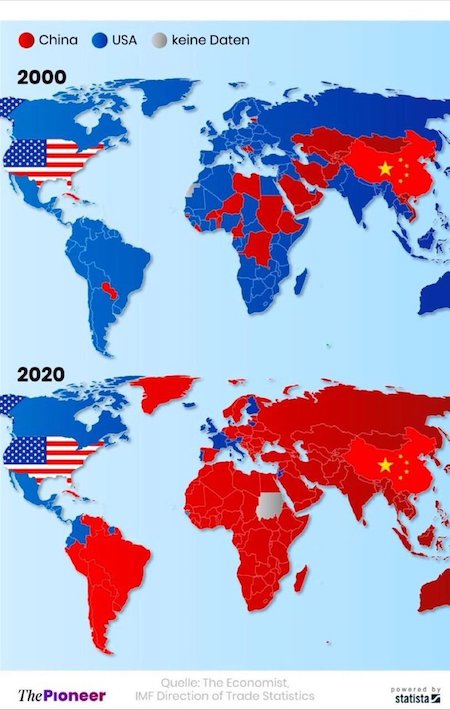
Nations whose largest trading partner is China (red) or the US (blue).

Those eyes
https://twitter.com/i/status/1692581874739085771

Support the Automatic Earth in wartime with Paypal, Bitcoin and Patreon.






